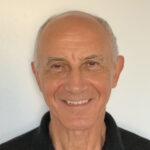
A sunflower moves without using willpower or cognition. The Sunflower Mind metaphor draws attention to the relational and embodied nature of our mind process.
In this course, you study how the bodily felt sense emerges in the context of interaction and explore the physicality of our relational patterns.
You do this experientially as you practice creatively using embodied experience to harness the transformative power of Integrative Focusing.
Sunflower Mind is one of the 2 courses I teach to help you add a more embodied, experiential dimension to your work. The 2 courses complement each other, as each one explores the clinical skills of Integrative Focusing from a different perspective.
In each course, our time together includes:
– a process group that integrates personal experience with therapy,
– supervision, which we do in an interactive and creative way,
– discussion of the underlying theory. The theory itself is presented in video or writing that you study on your own before class, so that all our time together is experiential.
In addition to our sessions together as a group, you will be assigned to ongoing Focusing partnerships between sessions.
The course is suitable for all levels of Focusing experience, including therapists who have no prior knowledge of Focusing.
See below: | Curriculum | Homework & time commitment | The instructor | Dates | Cost | Registration |
Curriculum

1. Embodied relationality
Conceptual learning: The physicality of felt experience, Reichian character styles, Polyvagal Theory, neuroception, and felt sense.
Clinical skills: Paying attention to the biological energy that emerges from interaction. Inhabiting the polyvagal self-states.
2. Two modes of attention: Focused and unfocused attention
Conceptual learning: Iain McGilchrist work on the Divided Brain.
Clinical skills: Inhabiting the state of focused attention, and the state of unfocused attention.
3. Embodied object relations
Conceptual learning: The layers that affect “direct” felt experience
Clinical skills: Literally “touching” the relational implicit (a protocol to direct the client’s attention away from purely conceptual and onto embodied experience)
4. Seeing embodied patterns
Conceptual learning: How the embodied patterns become visible.
Clinical skills: Recognize and embody patterns to help clients see them.
5. From oppression to liberation
Conceptual learning: Working with the energy embedded in embodied patterns to allow them to carry forward.
Clinical skills: Embodying the future self that is implicit in the present moment.
6. The orienting response to threat
Conceptual learning: The phases of the threat response, the context of bottom-up processes.
Clinical skills: Deconstructing what created the patterns.
7. How you tie it all together into your practice
Homework & time commitment

The live part of this course consists of 7 monthly online 2 1/2-hour sessions. There is a Q&A and experiential discussion of the lecture, supervision and process group. We may use demos, as well as creative forms such as role-playing a client’s situation, or rotating therapists within the same session with a “client.”
Before each session, you have a video and/or reading about the Focusing theme of the session (plan on 30 to 60 minutes of study per session for the required material, more for optional material).
Between sessions, you have at least 2 study groups per month, where you practice the skills discussed at the previous session. You will be assigned to a small group in the first session of the course.
Of course, in this course as in all others, we pay utmost attention to fostering a sense of safety and connection.
This is a highly experiential course. You are not passively attending classes, you are learning by participating and being seen. It is expected that you will attend every session of the course. We understand that life can be unpredictable, and we allow for one missed session (which you must make up with class recordings).
You can take this course on its own or as one of the 4 courses of the Integrative Focusing Therapy training, leading to certification by the International Focusing Institute.
The instructor

Serge Prengel is a Focusing-oriented therapist. In addition to Focusing, he is also trained in Core Energetics and Somatic Experiencing.
Over the years, he has been exploring the similarities and differences between different approaches to better understand how change happens. He has conducted over 200 interviews with therapists, Focusers, researchers, and mindfulness practitioners.
See more about Serge Prengel.
Dates

Seven sessions:
– Second Thursday of the month
– At a time convenient for people in many time zones (12 noon to 2:30 pm New York time).
Date of next cohort will be announced later in 2024 (please subscribe to newsletter as a therapist to be notified of course date).
Cost
The cost of this course is US $1,050 if you pay in 2 installments, or US $990 if you pay in full.
Note: no one will be turned away for lack of money. We will work with you to find a way to make this affordable.
Registration
Pre-register with the feedback form.